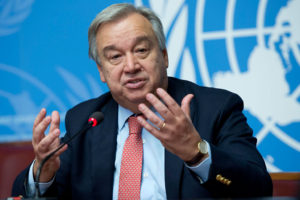Refugee summit a first
The first ever Refugee Solidarity Summit being held in Uganda aims to find support for the 1.3 million refugees in the country over the next four years.
Opening in Kampala this week, the two-day summit backed by the UN, aims to raise $2 billion for the second largest refugee hosting country globally after Turkey and to showcase Uganda’s refugee model.
United Nations Secretary-General António Guterres is in Uganda to co-chair the Summit together with President Yoweri Museveni.
Among the heads of state and about 500 dignitaries attending include Guinean President and Chairman of the African Union Alpha Conde, Somali President Mohamed Abdullahi Mohamed, Gabonese President Ali Bongo, Zambian President Edgar Lungu and Ethiopian Prime Minister Hailemariam Desalegn.
 Beside the pledging event to raise money for the refugees, the delegates will embark on a field visit to refugee-hosting districts and refugee settlements around the country to meet with, and appreciate their living conditions.
Beside the pledging event to raise money for the refugees, the delegates will embark on a field visit to refugee-hosting districts and refugee settlements around the country to meet with, and appreciate their living conditions.
The host communities are in 12 districts including Adjumani, Arua, Kampala, Nakivale and Mbarara.
More than 1.3 million refugees crossed into Uganda from South Sudan since the start of the conflict in the world’s newest country in December 2013 with a daily average of 2000 refugees.
The number doubled in 2016 after renewed violence in the troubled country.
The Ugandan government has opened its borders to the fleeing and also attempted to integrate host communities into its society while empowering the refugees to be economically self-reliant.
The government and the United Nations spent $150 million each to cater for the refugees in 2016 but more cash is needed.
Mr Guterres said on World Refugee Day that it was worrying for 80 per cent of the world’s refugees to be hosted by developing countries with “a dramatic impact” on their economy, society and security.
He urged governments to manage their borders but to increase their resettlement quotas and protect asylum seekers and people who deserve protection; to seek political solutions to world’s conflicts which are spurring the record 65.6 million refugees; and to fund humanitarian aid work.
Laurie Nowell
AMES Australia Senior Journalist












